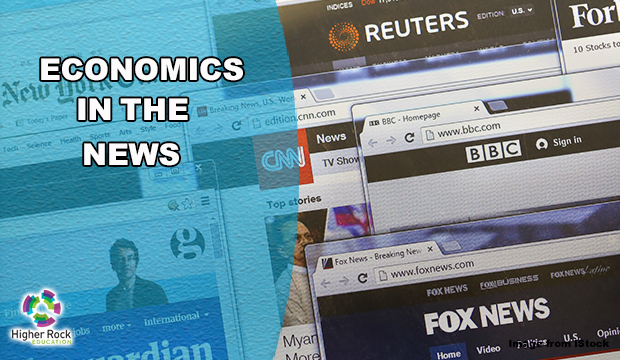
Economics in the News – Sept. 4-10, 2023
Economics impacts our lives every day. Below are some of the top storylines from this past week related to economics.
o The new iPhone 15 is expected to be unveiled, marking the 17th iteration of Apple’s flagship product. Over the past five years, the iPhone has increased its percentage of total smartphones sold around the world while expanding its share of sales in four of the world’s largest regions: China, Japan, Europe and India. More than 50 percent of new smartphones sold in the United States are iPhones, which is an increase from 41 percent in 2018. In the years ahead, Apple’s dominance is expected to widen, as the vast majority of teens own an iPhone.
While Apple has expanded its smartphone empire despite being the highest priced smartphone on the market and while sales of competing smartphones have fallen. Apple has overcome the price sensitivity of the iPhone by operating similarly to car sales. Users can trade in their old iPhone to help offset the cost of a new one, while discounts and monthly payment plans offered by wireless providers make the cost more affordable. Because of the brand loyalty that Apple has built, customers are more likely to buy another iPhone than switch to Google’s Android operating system. [The New York Times]
o What is holding Toyota back when it comes to sales of all-electric vehicles? With its hybrid lineup, Toyota was once the leading brand for environmentally conscious car owners. By pioneering the hybrid car, Toyota arguably did more to improve fuel efficiency and cut emissions than any other established automaker. But after investing so much time and money into hybrid models, Toyota has moved slowly to build cars that produce no tailpipe emissions.
Toyota and the Japanese auto industry are facing the biggest challenge they have confronted since becoming global giants in the 1980s. Governments are pushing to reduce the burning use of fossil fuels while consumer preferences are changing. The result has seen Toyota lose market share in the United States to the likes of Tesla, while its sales in China have fallen with the rise of Chinese electric automaker BYD. The story is similar among other Japanese automakers, where Honda, Mazda, Subaru and Nissan are not investing as heavily in electric vehicles as other automakers. [The New York Times]
o Rising temperatures across key agricultural regions across the United States are leading some farmers to harvest their crops in the middle of the night to safeguard the quality of their crops. Farmers are adapting to the threat of climate change the best they can. Some farmers are incorporating night harvest by using no more than heat lamps, while others are investing in expensive machinery. There are some known advantages to picking fruits and vegetables at night, most importantly is food quality. It’s easier to maintain the taste and texture of the fruit at cooler temperatures. It takes less energy to store already cooled fruits and vegetables before transport.
Agriculture experts believe that the practice is becoming an important part of the industry’s future. Extreme summer heat threatens the health of farmers and their employees, where working during the night reduces the risk of fainting or heat exhaustion. By the end of the century, climate change could lead to worldwide crop damage five to 10 times greater than what has been predicted, according to a study by the Journal of the European Economic Association. It’s also projected to cost the agriculture industry $4.65 billion annually in lost productivity by 2030. [The Washington Post]
o Car insurance rates are on the rise. According to the Bureau of Labor Statistics, car insurance for US drivers in July was 16 percent more expensive than July of last year, and 70 percent higher than car insurance rates in 2013. Insurance companies are blaming the rate hikes on higher repair costs and higher used car prices and maintenance costs are 13 percent higher than last year, according to the Bureau of Labor Statistics.
However, insurance companies are seeking alternatives to make up for the big payouts driven by natural disasters, as states that are prone to the climate-related disasters have seen the steepest rate hikes. Premiums in Florida increased 88 percent as insurers seek to makeup from the impact of losses from hurricanes. In Colorado, blizzards, hailstorms, and tornadoes have led to a 52 percent increase in claims. Rising rates hurt drivers who rely on their vehicles to get to and from work, stretching the budgets of millions of Americans. Car insurance is required by law and rates fluctuate based on factors that are out of an individual’s control. [The Washington Post]
o Monday marks the 22-year anniversary of the Sept. 11 attacks on the United States. What was the impact of the attacks on American business? How did the attacks impact the economy? Investopedia provides a look back to show the effect the attacks had on America and how, in some ways, the United States is still recovering from the attacks 22 years later.
The immediate aftermath of the Sept. 11 attacks saw the stock markets tumble and the terrorist attacks on that day exasperated a moderate recession following the dot com bubble. The hardest hit industries once trading resumed were airline and insurance sectors, after American Airlines and United Airlines flights were the carriers whose planes were hijacked. The markets and general business bounced back in relative short order with Gross Domestic Product (GDP) increasing 2.7 percent in the fourth quarter of 2001. In no other time in US history was the economy’s legendary strength and resilience more apparent. Some economists assert that many of the current economic problems facing the United States are lingering from Sept. 11, including intelligence efforts and heightened security. As well as the aftereffects of the wars that America fought until the US withdrew its troops from Afghanistan in 2021. [Investopedia]